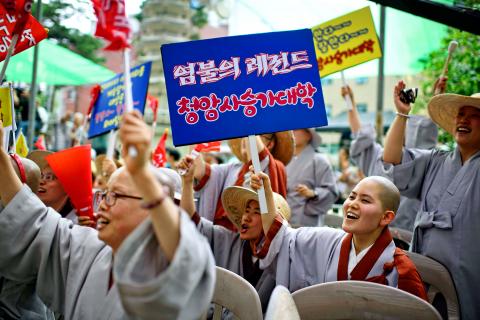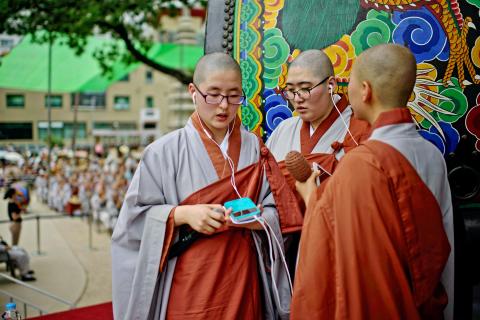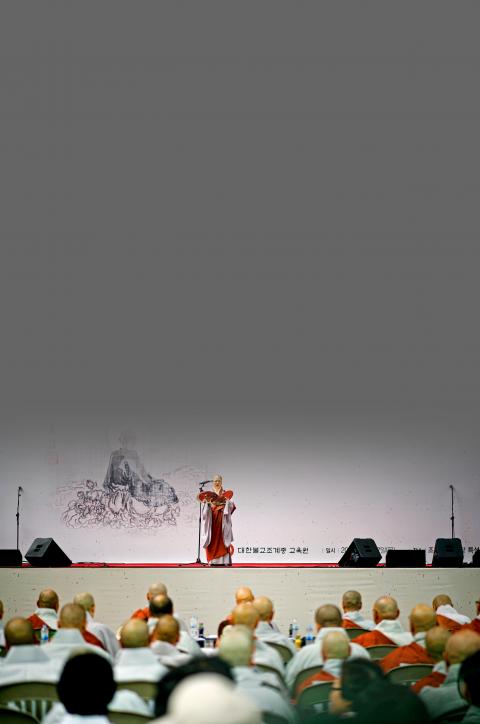South Korea’s top Buddhist organization held an experimental “prayer competition” on Thursday last week, featuring rapping nuns and singing monks in a bid to attract new, younger followers.
More than 300 monks and nuns packed a large temple in downtown Seoul to take part in the competition hosted by the Jogye Order of Korean Buddhism.
Participants — mostly young monks — chanted prayers, or invocations, from classic Buddhist scriptures, as well as “freestyle” prayers they composed.

Photo: AFP
照片:法新社
While many delivered traditional, monotone recitations, some opted for something bolder.
A group of three young nuns delivered a blistering performance of a rap song derived from The Heart Sutra — one of the most popular Buddhist scriptures — and using their own lyrics promoting love and harmony.
“Great wisdom, perfect wisdom. Buddha’s teachings that show you the way!” Hye-Kang bellowed out to cheers from hundreds of excited followers and monks.

Photo: AFP
照片:法新社
The 25-year-old nun, clad in gray robes, waved at the audience urging them to clap their hands as she jumped around the stage.
She was accompanied by two equally animated nuns — on traditional gong and drum — as she rapped over the sutra refrain “Aje Aje Bara Aje (Come, come, come upward).”
Buddhist tenets of humility and overcoming material cravings were briefly pushed aside as monks from Hye-Kang’s temple chanted “We’re here to win.”

Photo: AFP
照片:法新社
The contestants were competing for a cash prize of three million won (US$2,900).
Another nun, Go-Woo, also went down the hip-hop route, rapping a mix of classic scriptures and original lyrics praising Buddha’s teachings.
“You’re not alone. Let’s take down the wall among us and share the teachings of wisdom.” she sang.
Hye-Kang said she and her fellow performers had taken the contest very seriously, practicing day and night for a month for the performance.
“I wanted more young people to take an interest in Buddhism and the message of its prayers,” she said.
The Jogye Order claims 10 million followers, but Buddhism — once the dominant religion of South Korea — has been overtaken by Christianity in terms of popularity.
The Christianity practiced in South Korea is strongly evangelical, with a lot of proselytizing work that some Buddhists believe is bringing young people to the churches rather than the temples.
Yin-Mook, a senior member of the Jogye Order and one of the judges of last Thursday’s event, said efforts were needed to make Buddhist scripture more accessible.
“Many Buddhist prayers are written in ancient words many people are not familiar with, so we asked participants to write prayers in plain, easy-to-understand language,” he said.
“We wanted to let people, especially young people and children, know Yumbul (Buddhist prayers) can be more interesting and easier to practice than they think,” he added.
(AFP)
南韓最大佛教組織上週四舉行實驗性「誦經比賽」,饒舌比丘尼與說唱比丘成為全場焦點,目的是為了吸引新進年輕信徒。
超過三百位和尚與尼姑擠滿了一座位於首爾市中心的大型廟宇,他們準備參加由大韓佛教曹溪宗所舉辦的這項賽事。
以年輕和尚居多的參賽者們,唱誦著古典佛教經文中節錄的祈禱文或祈願文,也有「形式自由發揮」的自創祈禱文。
當許多人以傳統單音調念經的同時,尚有一些人選擇採取更大膽的誦經風格。
一個由三名比丘尼所組成的團體,獻上一段口碑載道的饒舌歌曲演出,靈感來自《心經》並融入演出者自己宣揚愛與和諧的歌詞。《心經》是佛經中最廣為人知的經文之一。
法號為Hye-Kang的比丘尼,在上百位信徒與比丘們情緒高張的歡呼聲中,吼唱著「大智慧、完美智慧。佛陀教法將引領你邁向無與倫比的智慧。」
身穿灰色僧衣的這名二十五歲比丘尼向觀眾揮著手,當她在舞台上滿場跳動同時,要求台下觀眾用雙手一起跟著打拍子。
當她唱著「Aje Aje Bara Aje」(來、來,往上來)的經文副歌部分時,另外兩名同樣也是活力十足的比丘尼則以鑼鼓伴隨著。
與Hye-Kang出自同一寺院的和尚們,暫且將佛教教義中應有的謙遜與對物質慾望的抑制拋諸腦後,反覆喊著「我們來就是要贏」的口號。
參賽者們為著現金獎金三百萬韓圓(兩千九百美元)而競爭。
另一位法號為Go-Woo的比丘尼則是走嘻哈風路線,饒舌唱著混和古典經文與原曲歌詞以讚美佛陀的教法。
她唱著:「你並不孤單。讓我們卸下我們之間的那道牆,並分享智慧的教義。」
Hye-Kang說,她與她的同行演出者們很看重這場競賽,為了演出,她們這一個月來不分晝夜練習。
她表示:「我希望更多年輕人可以對佛教與其祈禱文中的含義產生興趣。」
曹溪宗宣稱其有一千萬個信徒,但曾在南韓是最大宗教信仰的佛教,在支持度上,目前已經被基督教超越了。
南韓基督教是激進的福音派新教,包括勸說他人入教的大量傳教工作,此舉被佛教徒認為是為何年輕人走進教會而非廟宇的主因。
曹溪宗的元老級法師、同時也是上週四比賽評審Yin-Moo表示,在讓佛教經典更加親民的的努力上,仍需加把勁。
他表示:「許多佛教祈禱文常以大眾所不熟悉的古字書寫,所以我們請參賽者將祈禱文改以直白、淺顯易懂的語言寫出。」
他補充道:「我們想要讓民眾—特別是年輕一輩的青年與兒童—瞭解,Yumbul(佛教祈禱文)也可以是比想像中來得更有趣且更容易學習。」
(法新社/翻譯:林亞蒂)

In an effort to fight phone scams, British mobile phone company O2 has introduced Daisy, an AI designed to engage phone con artists in time-wasting conversations. Daisy is portrayed as a kindly British granny, exploiting scammers’ tendency to target the elderly. Her voice, based on a real grandmother’s for authenticity, adds to her credibility in the role. “O2” has distributed several dedicated phone numbers online to direct scammers to Daisy instead of actual customers. When Daisy receives a call, she translates the scammers’ spoken words into text and then responds to them accordingly through a text-to-speech system. Remarkably, Daisy

Bilingual Story is a fictionalized account. 雙語故事部分內容純屬虛構。 Emma had reviewed 41 resumes that morning. While the ATS screened out 288 unqualified, she screened for AI slop. She could spot it a mile away. She muttered AI buzzwords like curses under her breath. “Team player.” “Results-driven.” “Stakeholder alignment.” “Leveraging core competencies.” Each resume reeked of AI modeling: a cemetery of cliches, tombstones of personality. AI wasn’t just changing hiring. It was draining the humanity from it. Then she found it: a plain PDF cover letter. No template. No design flourishes. The first line read: “I once tried to automate my

Every May 1, Hawaii comes alive with Lei Day, a festival celebrating the rich culture and spirit of the islands. Initiated in 1927 by the poet Don Blanding, Lei Day began as a tribute to the Hawaiian custom of making and wearing leis. The idea was quickly adopted and officially recognized as a holiday in 1929, and leis have since become a symbol of local pride and cultural preservation. In Hawaiian culture, leis are more than decorative garlands made from flowers, shells or feathers. For Hawaiians, giving a lei is as natural as saying “aloha.” It shows love and

1. 他走出門,左右看一下,就過了馬路。 ˇ He walked outside, looked left and right, and crossed the road. χ He walked outside and looked left and right, crossed the road. 註︰並列連接詞 and 在這句中連接三個述語。一般的結構是 x, y, and z。x and y and z 是加強語氣的結構,x and y, z 則不可以。 2. 他們知道自己的弱點以及如何趕上其他競爭者。 ˇ They saw where their weak points lay and how they could catch up with the other competitors. χ They saw where their weak points lay and how to catch up with the other competitors. 註:and 一般連接同等成分,結構相等的單詞、片語或子句。誤句中 and 的前面是子句,後面是不定詞片語,不能用 and 連接,必須把不定詞片語改為子句,and 前後的結構才相等。 3. 她坐上計程車,直接到機場。 ˇ She took a cab, which took her straight to the airport. ˇ She took a cab and it took her straight